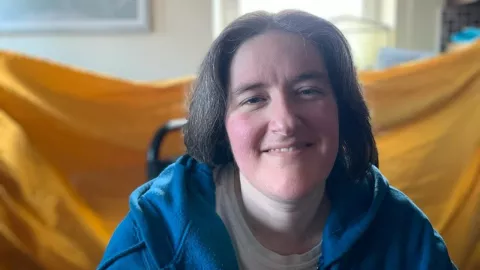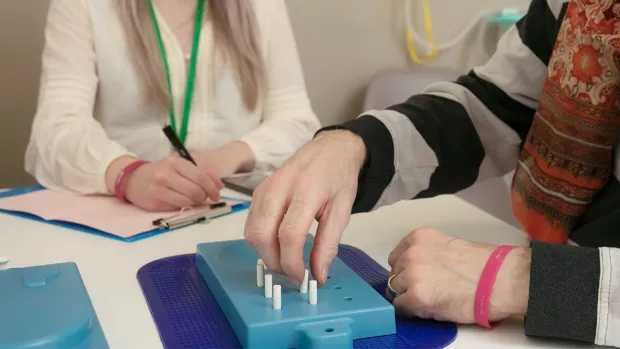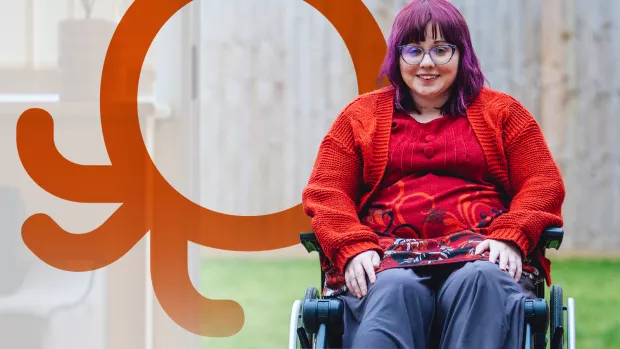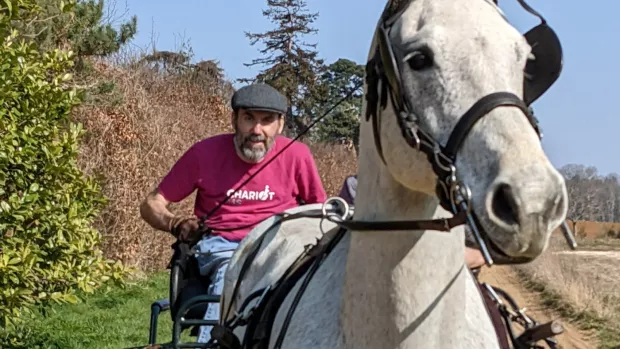
MS changed my life - I want to help stop it for good
Karine was diagnosed with primary progressive MS when she was 28. She shares how it's changed her life and the hope trials like Octopus give her.
Hi, my name is Karine and I was diagnosed with primary progressive MS when I was 28 years old.
It’s a diagnosis that’s significantly altered my life. And that of my partner Sarah, who supports me.
Life before my MS diagnosis
Sarah and I lived in a flat we’d recently bought, along with our two kittens. We both had full-time jobs, so it was a busy life. We loved to travel and try new things.
I began to notice a heaviness in one of my legs, which would come and go. It was subtle at first, I shrugged it off and carried on with my day. But it then became a limp. At first I was able to hide it, but the more pronounced the limp became, the more I started to hide away.
Read more about MS symptoms and signs
I didn't want to go out and I avoided social gatherings as much as possible. I was afraid of what was happening to me and I didn’t want anyone to witness it.
I thought I was doing a good job of hiding it, but it wasn't going away. So the time came for the dreaded visit to the doctor.
I had mixed feelings about my diagnosis
After a year of waiting, I finally received the diagnosis of MS. Though I was expecting it, the diagnosis came as a massive relief. I could stop hiding, we could start living our lives again.
It was quite frightening to receive a primary progressive diagnosis – I was naturally fearful of the unknown, of what the future held for us. But it was also reassuring to have a name for my symptoms.
Sarah and I used it as an opportunity to live life to the fullest. We very quickly realised that life is short and we didn’t want to miss it. Our adventures started and we visited places we’d always wanted to go to.
Right after my diagnosis, we hopped on a plane to Lanzarote. What were we waiting for? We needed sun and heat and we didn’t have to hide anymore. We’ve been on so many adventures and continue to do so.
MS has had a massive impact on our lives
Over the last nine years, I’ve worked with physios to maintain my feet as long as possible. I managed to walk down the aisle with my now wife Sarah in 2015! But I started using a mobility scooter for longer journeys, and now I use my trusty powerchair.
The prospect of a wheelchair can seem daunting and terrifying, but by the time I needed one I was ready. The physical aspect came first – I was tired and it was becoming dangerous to move around without falling. Emotionally, it was only when I started using the chair that I realised life would be easier this way. And I had more energy as a result.
Read more about getting about with MS
We’ve both had to give up working, Sarah is now my full-time carer. This has had an impact on both of our mental health as we learned our new roles. But the most important thing is that this has brought us closer together as a couple.
I want to help stop this cruel illness
I know how much MS can affect someone’s future prospects: relationships, ability to work and carry out day-to-day activities.
It would help so many people if more treatments could be found, and more quickly.
I’ve been excited to read about Octopus and how innovative it is. I hope by testing treatments in this way, they’ll be able to find effective options much more quickly.
I'd be very interested in taking part in this trial. Even if it doesn't lead to new treatments for me directly, I’d benefit from the regular monitoring, tests and contact with neurologists. I’d also love to be part of something that’d help others with MS in the future.
I’ve been involved with the MS Society for about nine years now. I think it’s so important to support the work they do and help fund research into this cruel illness.
It would mean so much to me – and Sarah - if researchers could find more ways to treat it. And potentially stop it altogether.




